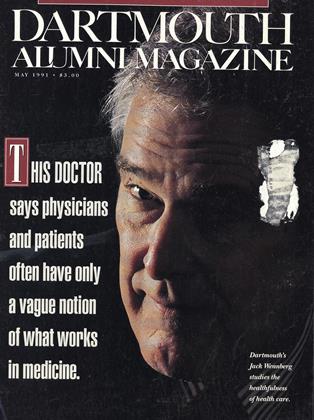At the leading edge of the Revolution in the way medical procedures are evaluated is the Medical School's Center for the Evaluative Clinical Sciences. It is bringing together research talent from around the College and the Medical Center; plans are also underway to recruit as many as 12 leading epidemiologists, medical clinicians, and biostatisticians. The mission is two-fold: to carry out studies in a field called "outcomes research," and to launch a graduate program to train new scientists who can evaluate medical procedures. Likely to be one of Dartmouth's new "pinnacles of excellence" areas in which the College will carve out a national specialty the center could become a major conduit for federal and private grant money; currently, it brings in more than $2 million of the Medical School's $50 million an nual budget. Some of the backing is coming from the new $117 million Agency for Health Care Policy and Research, a division of the U.S. Public Health Service, which Jack Wennberg and other leading lights in the outcomes field were instrumental in convincing Congress to create in 1989. Dartmouth's PORT, or Patient Outcomes Research Team, which is probing the mysteries of prostate disease, is now one of 11 such teams around the country funded by the agency to carry out outcomes research.
According to William Gulp, associate dean of the Med School For research and education, Wennberg's center is a prime example of the role that academic medical centers will play in the future: as providers and disseminators of scientific information about medicine to the rest of the health-care community.
A new center pulls intalent from cliniciansto statisticians.
 View Full Issue
View Full Issue
More From This Issue
-
 Cover Story
Cover StoryDOCTOR WENNBERG'S UNCERTAINTY PRINCIPLE
May 1991 By Susan Dentzer '77 -
 Feature
FeatureTHE BLUE ZOO
May 1991 By Robert Eshman '82 -
 Feature
FeatureStory Time
May 1991 By Nancy Millichap Davies -
 Article
ArticleDR. WHEELOCK'S JOURNAL
May 1991 By "E. Wheelock" -
 Article
ArticleTHEATERS OF WAR
May 1991 By Professor Lynda Boose -
 Class Notes
Class Notes1980
May 1991 By Michael H. Carothers
Article
-
 Article
ArticleRepresentative of the Athletic Council
December, 1925 -
 Article
ArticlePresent and Proposed Alumni Council Districts
April 1940 -
 Article
ArticleDartmouth Night
October 1943 -
 Article
ArticleThe College Clarifies Mt. Washington Policy
January 1954 -
 Article
Article1964
MAY | JUNE 2016 By —Harvey Tettlebaum -
 Article
ArticleDone in Prison
April 1940 By The Editor

